ECTE 2025

8th European Conference of Tropical Ecology (24 to 28 February 2025, Amsterdam, The Netherlands)
During the Society for Tropical Ecology conference held in Amsterdam from 24 to 28 February, ReCo-Andes members presented the main results of ongoing projects in the tropical forests of Ecuador during the last years.

Andrea Chavez, PhD student at the University of Ghent, presented her research on «Water Use Efficiency (iWUE) in Threatened Tropical Montane Forests of Ecuador: Insights from Herbarium Data». She analyzed isotopes on leaf samples from herbarium collections of four Andean species, collected over eight decades (1940-2020). Her preliminary results highlighted an apparent decline in iWUE in Andean species. This suggests that these species are not capturing carbon as expected with current atmospheric fertilization. She also stated the value of herbarium specimens to understanding past and future ecological trends, beyond their value for taxonomic studies.
Alejandra Moscoso presented her work on «Liana Diversity and Abundance in Dry and Moist Tropical Montane Forests in Ecuador». Her research has used an inventory of lianas in a total of 125 observation plots distributed between 600 and 3000 m a.s.l., Alejandra highlighted that lower temperatures and reduced water availability leading to a decrease in liana abundance. These results provided valuable insights into how lianas respond to environmental factors and their implications for tropical montane forest ecosystems in the future.


During the poster session, Franklin Marín, PhD student at Ghent University, presented his research on «Effects of Elevation, Shading, and Exotic Pastures on the Early Performance of Native Species in Andean Forest Reforestation». His research evaluates seedling performance in Andean using an experimental set up that manipulates shade and competition with grasses in old pastures, in along a 900 m elevational gradient in southern Ecuador. His results showsthat elevation and shade are the main modulators of seedling performance. Therefore these factors should be considered for designing more effective restoration strategies in similar environments
In addition, Ximena Palomeque, Gabriela Maldonado, and Selene Báez led an oral session on «Drivers of Recovery in Restored Tropical Forests».
This event was an opportunity to bring most of the members of the RECO-Andes project together at the same location. Aside from the research shared, we could interact and plan further activites and a continuation of the project in the future. We develop our work within a framework that strengthens North-South collaboration through science and the common goal of working in tropical mountain forests.

Members of the Q-forestLab with the ReCo-Andes team dinner.